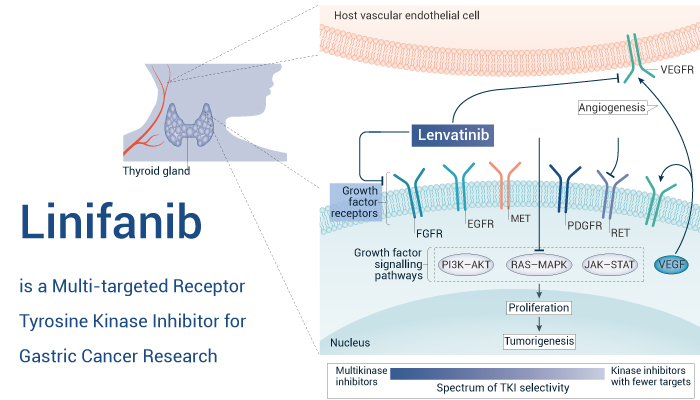Platelet-derived growth factor receptor (PDGF-R) is a cell surface tyrosine kinase receptor for a member of the platelet-derived growth factor (PDGF) family. PDGF subunits -A and -B are important factors that regulate cell proliferation, cell differentiation, cell growth, development, and many diseases including cancer. In particular, gastric cancer is highly dependent on tumor angiogenesis, resulting in uncontrolled mortality. Introduced here is Linifanib (ABT-869), which inhibits VEGF and PDGF and has anticancer activity. At the same time, miR-10b is a miRNA overexpressed in metastatic tumors, and Linifanib is also a specific inhibitor of miR-10b, blocking the biosynthesis of miR-10b.

Linifanib (ABT-869) is a highly potent, oral, multi-target inhibitor of the VEGFR and PDGFR families.
The IC50s of Linifanib against KDR, FLT1, PDGFRβ, and FLT3 are 4, 3, 66, and 4 nM, respectively. whereas activity against unrelated RTKs, soluble tyrosine kinases, or serine/threonine kinases was much lower. Furthermore, in vitro studies found that high miR-10b levels reduced the efficacy of linifanib in inhibiting tyrosine kinases. When the level of miR-10b is high, it can “hijack” Linifanib and reduce its kinase inhibitory effect on cancer, resulting in reduced anti-tumor efficacy.
Linifanib exhibits potent antiproliferative and apoptotic effects on cancer cells, particularly when these cancer cells are dependent on mutant kinases (such as FLT3) for their proliferation. It (0-10 μM; 72 h) inhibits cell proliferation of 8305C and 8505C cell lines in vitro in a concentration-dependent manner. Linifanib significantly reduced phosphorylated CSF-1R levels in 8505C and 8305C cells after 24 and 72 hours.
Linifanib also showed considerable in vivo potency. It (10 mg/kg; p.o.; once daily for 33 days) has a synergistic effect with Irinotecan and exhibits significantly enhanced anti-tumor activity. Linifanib demonstrated efficacy in human fibrosarcoma and xenograft models of breast, colon and small cell lung cancer (ED50=1.5-5 mg/kg twice daily) and was also effective in orthotopic treatment (>50% inhibition ) Breast and glioma models. Tumor size reduction and tumor regression were observed in epidermoid carcinoma and leukemia xenograft models, respectively.
In summary, Linifanib is a potent multi-target inhibitor of the VEGFR and PDGFR families and exhibits broad tumor suppressive potency.
References:
[1]. Albert DH, et al. Mol Cancer Ther, 2006, 5(4), 995-1006.
[2]. Monroig-Bosque PDC, et al. Sci Rep. 2018;8(1):13106. Published 2018 Aug 30.
[3]. Banchi M, et al. Am J Cancer Res. 2020;10(7):2120-2127. Published 2020 Jul 1.
[4] Chen J, et al. Sci Rep. 2016 Jul 8;6:29382.